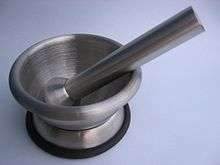mortar
English

Mortar and pestle.
Etymology
From Middle English morter, from Old French mortier, from Latin mortārium.
Pronunciation
- Rhymes: -ɔː(r)tə(r)
- (UK) IPA(key): /ˈmɔːtə(ɹ)/
Audio (US) (file)
Noun
mortar (countable and uncountable, plural mortars)
- (uncountable) A mixture of lime or cement, sand and water used for bonding building blocks.
- (countable) A muzzle-loading, indirect fire weapon with a tube length of 10 to 20 calibers and designed to lob shells at very steep trajectories.
- (countable) A hollow vessel used to pound, crush, rub, grind or mix ingredients with a pestle.
Derived terms
Translations
mixture of lime or cement, sand and water
|
|
short large-bore cannon
|
|
vessel used to grind ingredients
|
|
Verb
mortar (third-person singular simple present mortars, present participle mortaring, simple past and past participle mortared)
Related terms
Ido
Pronunciation
- IPA(key): /mɔrˈtar/
Verb
mortar (present mortas, past mortis, future mortos, conditional mortus, imperative mortez)
- (intransitive, literally and figuratively) to die, cease to live, cease to be, depart this life
- (intransitive) to go out (of fire, lights, etc.)
- (intransitive) to come to an end (of movement)
Conjugation
Conjugation of mortar
 |
present | past | future | ||||
|---|---|---|---|---|---|---|---|
| infinitive | mortar | mortir | mortor | ||||
| tense | mortas | mortis | mortos | ||||
| conditional | mortus | ||||||
| imperative | mortez | ||||||
| adjective active participle | mortanta | mortinta | mortonta | ||||
| adverbial active participle | mortante | mortinte | mortonte | ||||
| nominal active participle | singular | mortanto | mortinto | mortonto | |||
| plural | mortanti | mortinti | mortonti | ||||
Middle English
Norwegian Nynorsk
Romanian
This article is issued from
Wiktionary.
The text is licensed under Creative
Commons - Attribution - Sharealike.
Additional terms may apply for the media files.